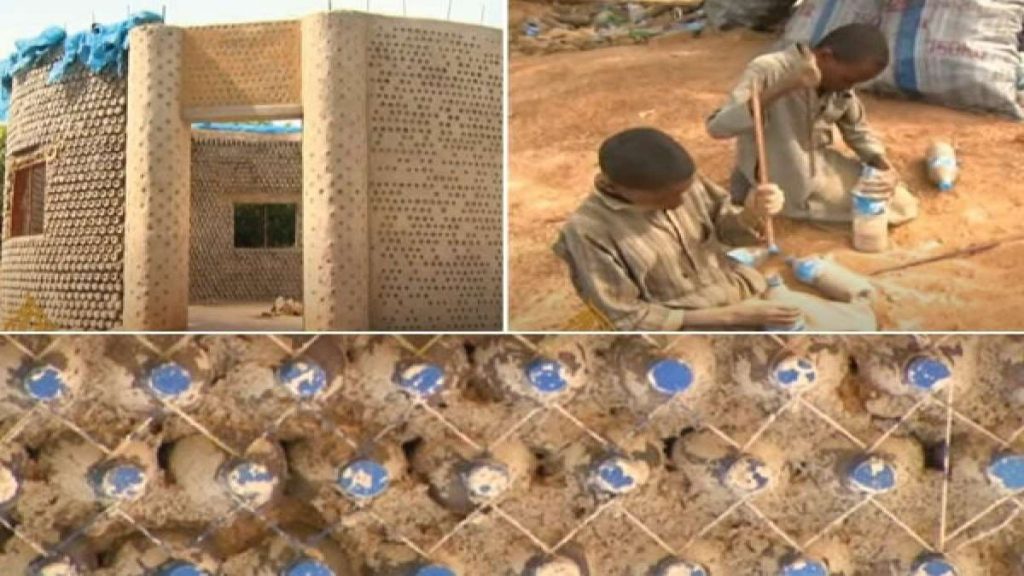A major environmental problem is the use of plastic. Plastic production, which doesn’t break down, has gone up a lot since the 1950s and now causes a lot of damage to the environment. Overuse and disposal of plastics have become major problems for the environment, but Nigeria is showing the rest of the world how to put these materials to good use. Companies in Nigeria are now making strong buildings out of used plastic bottles. These buildings can withstand both earthquakes and gunfire.
The “bottle trick” is the term for this method of technology. The village of Yelwa is home to the world’s first home constructed entirely from plastic bottles. Government officials and traditional leaders have been known to visit the home in order to marvel at its architectural splendor. According to the Power of Positivity, the eco-friendly house was constructed using only plastic bottles, sand, and mud.


The wall takes on a distinctive appearance thanks to the bottles, each of which has been filled with sand and turned upside down, with the bottom facing the outside. They’re used in the same way that bricks are, stacked one on top of the other and held together with mud. While most of the world’s population lives in square dwellings, Nigerians more commonly inhabit round abodes. The “bottle trick” is a way to build a house in the shape of a circle, just like the traditional homes in the area.
The houses are stunning, but their real purpose is to help the planet by finding new uses for old plastic. Bedrooms, living rooms, bathrooms, toilets, and kitchens are standard in most new constructions. Experts estimate that 7,800 plastic bottles are needed for each building. Businesses have already built 25 buildings out of plastic bottles, and people who care about the environment are likely to be very interested in them. The businesses claimed that they start with a concrete slab and then construct the walls out of recycled materials like plastic bottles and sand.
A Greek businessman and environmentalist have donated a sizeable sum of money to the project because of the international interest in the novel approach. Bottle brick technology may have found success in Nigeria, but it was actually tested nearly ten years ago in India, South America, and Central America. In comparison to the cost and environmental impact of building with brick, this is a viable alternative for many people.
Plastic bottle houses are 67% cheaper than conventional brick-and-mortar homes, according to Yahaya Ahmed of the Nigerian Development Association for Renewable Energies. He also mentioned that the houses are 20 times stronger than bricks due to the use of sand packed in plastic bottles. Ahmed claims preparations have been made to create a three-story structure from recycled plastic bottles and mud.
The homes were designed with the hot weather in Nigeria in mind. Since the sand reflects the sun’s rays, it helps keep the houses at a comfortable temperature. Due to a lack of recycling centers and waste management, plastic pollution is a serious problem in developing countries like Nigeria. The improper disposal of plastic waste causes problems for the natural environment. Businesses are banking on the idea that “brick technology” houses will encourage more people to recycle their plastic this way.
According to Zenith International, bottled water makes up 20-25% of the water market, or about 500 million liters annually. The widespread disposal of these bottles poses a serious threat to the natural world. Used bottles are in high demand because of these initiatives, which will reduce the amount of trash that ends up in landfills or waterways.
The technology has been lauded for its ability to recycle plastic, but critics say it could eventually lead to an even bigger problem. Due to its importance in building, sand may become harder and harder to find as more digging is done to meet rising demand. Because of this, buying one of these houses might not be worth the money at all.
Many people are holding out hope that this technology will allow them to build low-cost buildings that will speed up development. In an effort to better educate locals and stimulate economic growth, the Development Association for Renewable Energies has proposed constructing a local school.




